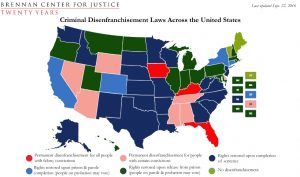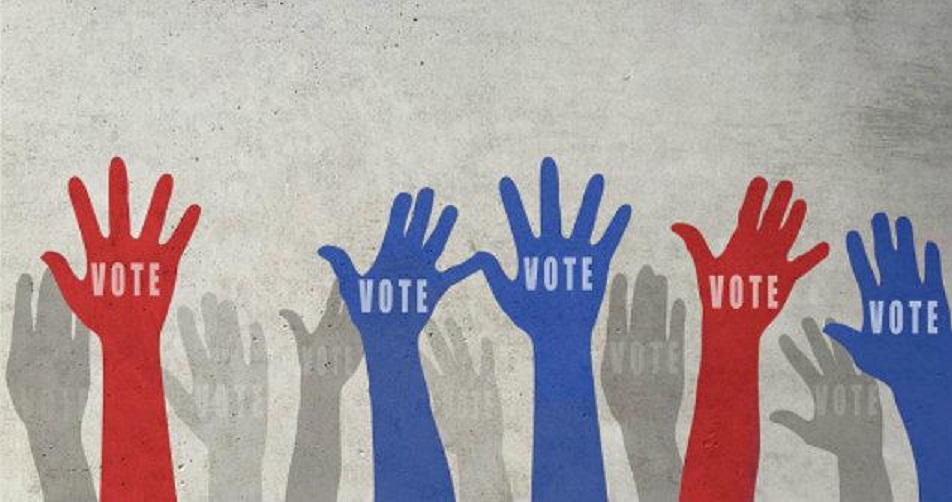Tim Canova, Chair, Progress For All
Thirty-four states still bar Americans with criminal convictions from voting. That’s nearly 6 million Americans who were barred from voting in the last presidential election, and about 4.7 million of those were no longer even in prison. They’re working, paying taxes, raising their families, contributing to our communities, but still denied their fundamental democratic right to vote.
Felony disenfranchisement serves no good purpose. In fact, these laws are deeply rooted in our troubled racial history and have a disproportionate impact on lower income people of color. Nationwide, 13% of voting age African-Americans have lost their right to vote, a rate that is 7 times higher than the national average. That’s why felony disenfranchisement, combined with the racial targeting of the war on drugs, has been referred to as “The New Jim Crow.”
I’ve been in this fight for many years. In 2001, as an activist law professor at the University of New Mexico, I helped spearhead a grassroots lobbying campaign that overturned New Mexico’s felony disenfranchisement law that had barred about six percent of the population from voting because of prior non-violent felony convictions. This voting bar fell overwhelmingly on Hispanics, Native Americans, and black citizens, reflecting in large part the racist impact of our war on drugs. We worked across party lines and helped convince a Republican governor to sign the measure into law..
Over the last two decades more than twenty states have taken action at the legislative or executive level to allow more people with criminal convictions the right to vote and to access that right more easily. But millions of American citizens are still without a political voice in elections because the current patchwork of laws that disenfranchise people has created an inconsistent and unfair electoral process.

That’s why at Progress For All we are calling for national action and mobilizing the grassroots to support the re-introduction of federal legislation, the Democracy Restoration Act, introduced in the 114th Congress by Senator Ben Cardin (D-MD) and Representative John Conyers (D-MI).
Consensus is building across the political spectrum on the pressing need to reform our criminal justice system and to restore voting rights to people who have fulfilled their sentences for non-violent offenses.
According to a recent survey by PRRI, a non-partisan opinion research group, “nearly three-quarters (74%) of Americans agree that people who have been convicted of felonies should be allowed to vote after they complete their sentences. . . . And restoring voting rights is huge across all segments of society – with majorities of Democrats (83%), Independents (73%), and Republicans (62%) agreeing with this policy, as do strong majorities of African-Americans (85%), Hispanics (78%), and Whites (71%).”
While we continue to organize around federal legislation, we will also be mobilizing Floridians to support the Suspension on Civil Rights Act introduced in the Florida State Legislature last week by Representative Sean Shaw (D-HD-31) and Senator Daryl Rouson (D-SD-19) which ends the automatic suspension of civil rights for those convicted of a non-violent felonies.
We are also working on a citizen’s ballot initiative – Florida’s Voting Restoration Amendment for the November 2018 ballot – in coalition with law enforcement officials, faith leaders, and civil and human rights groups. Our coalition has already gathered the required 70,000 signatures to trigger review by the Florida Supreme Court – a process required of all constitutional amendments..
Florida has one of the most punitive disenfranchisement policies in the country, permanently barring all citizens with non-violent felony convictions from voting unless they individually apply to the state office of Executive Clemency to get their voting rights restored. This bars 1.6 million Floridians – including more than 1 in 5 African-Americans in the state – from voting at the polls.
The current clemency rules, which Florida Governor Rick Scott issued in 2011, are the most harsh and restrictive in the nation. Scott opposes restoring voting rights across the board and his record shows it. In December of 2015, nearly 5 years after taking office, Scott’s administration had restored voting rights to fewer than 2,000 Floridians statewide, while 20,000 applications remained pending. Meanwhile, in the period between 2010-2016, the disenfranchised population in Florida grew by nearly 150,000 to a staggering 1,686,000.
Florida’s law gives the governor the power to pick and choose who gets to vote and who does not. The law is rooted in a racist past and continues to deny the right to vote to more than 20 percent of Florida’s African-American voting-age citizens. Florida should remember its past and leave it behind. It is time to end this vestige of Jim Crow, and for Florida to do its part to realize the true promise of American Democracy.
We all believe in second chances, and at Progress For All we are working hard to demand that government at every level should restore voting rights and ensure our voting system is free, fair, and accessible to all Americans.

